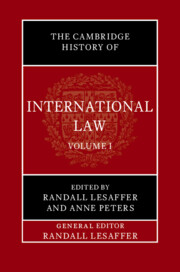Book contents
- The Cambridge History of International Law
- The Cambridge History of International Law
- Frontispiece
- The Cambridge History of International Law
- Copyright page
- Contents
- Plates
- Tables
- Contributors
- Preface
- 1 Scope, Scale and Humility in the History of International Law
- Part I The Historiography of International Law
- 2 A Thousand Flowers Blooming, or the Desert of the Real?
- 3 Political Thought and the Historiography of International Law
- 4 The Turn to the History of International Law in the Field of International Relations
- 5 Economic History and International Law
- Part II The Historiography of International Law
- Index
- Plate Section (PDF Only)
- References
5 - Economic History and International Law
A Peculiar Absence
from Part I - The Historiography of International Law
Published online by Cambridge University Press: 06 December 2024
- The Cambridge History of International Law
- The Cambridge History of International Law
- Frontispiece
- The Cambridge History of International Law
- Copyright page
- Contents
- Plates
- Tables
- Contributors
- Preface
- 1 Scope, Scale and Humility in the History of International Law
- Part I The Historiography of International Law
- 2 A Thousand Flowers Blooming, or the Desert of the Real?
- 3 Political Thought and the Historiography of International Law
- 4 The Turn to the History of International Law in the Field of International Relations
- 5 Economic History and International Law
- Part II The Historiography of International Law
- Index
- Plate Section (PDF Only)
- References
Summary
Until about twenty-five years ago, economic historians (both those in economics departments and in history departments) had little to say about international law. There possible causes of this (beyond the possible insignificance of international law to the project of economic history) are likely the similar intellectual bases for economics and international law prior to the twentieth century, the lack of an accessible archival and intellectual base upon which to conduct the research, and the professional bias of academic historians against writing about events to close to the present. But as time as marched onward, the development of international economic law in the twentieth century has become of increasing interest to historians broadly interested in the history of international institutions and capitalism.
Keywords
- Type
- Chapter
- Information
- The Cambridge History of International Law , pp. 162 - 184Publisher: Cambridge University PressPrint publication year: 2024

